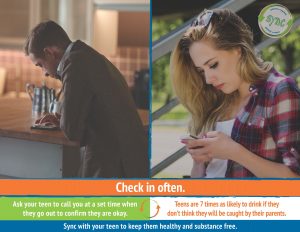Our local communities have spent the last few weeks gearing up for a unique but hopeful academic year for children and young adults. Back to school routines look a bit different this year, adding to the traditional stressors that affect parents, caregivers, children and young adults. Current events have only added to these factors, especially the growing concern over mental health and substance use regarding young adults.
Staying in-sync and connected with your child or teen is a key cornerstone for preventing substance use, but may seem even more difficult this year due to constant uncertainty of our daily lives. Parents may be worried about loosing strength in their relationship with their child or teen. Despite present barriers, there are still actions that can be taken to help young adults through a rapidly changing time where we all are experiencing new emotions and challenges.
- Find time to do weekly check-ins and don’t be afraid to bring up feelings of anger, anxiety or resentment.
- Look for creative ways to ask how they’re doing, like using a 1 to 10 scale. Ask them what they could do to help them decrease negative feelings and what you can do to help.
- Keep traditional family routines like mealtime, family meetings or game nights. This will serve as a foundation to have an ongoing dialogue. [1]

Here are some additional tips to stay connected through routines with your child or young adult this school year.[2]
- When there is not enough personal space for you or your child/teen and you find yourself getting cranky or frustrated, be a positive role model. Time together is an opportunity for you to model positive coping strategies.
- A reliable daily schedule with designated time for learning, leisure, physical activity and sleep promotes overall well-being and reduces the stress of making plans on the fly.
- Avoid multitasking and offer lots of encouragement instead. Positive reinforcement can help kids stay motivated.
- Engaging young adults in the process of creating their new routine helps you as the parent gain buy-in to ensure success.
- Stay near your kids and give them choices throughout the morning to provide them with a sense of control.
Tools for Parents
How to Build Relationships With Students During COVID-19

